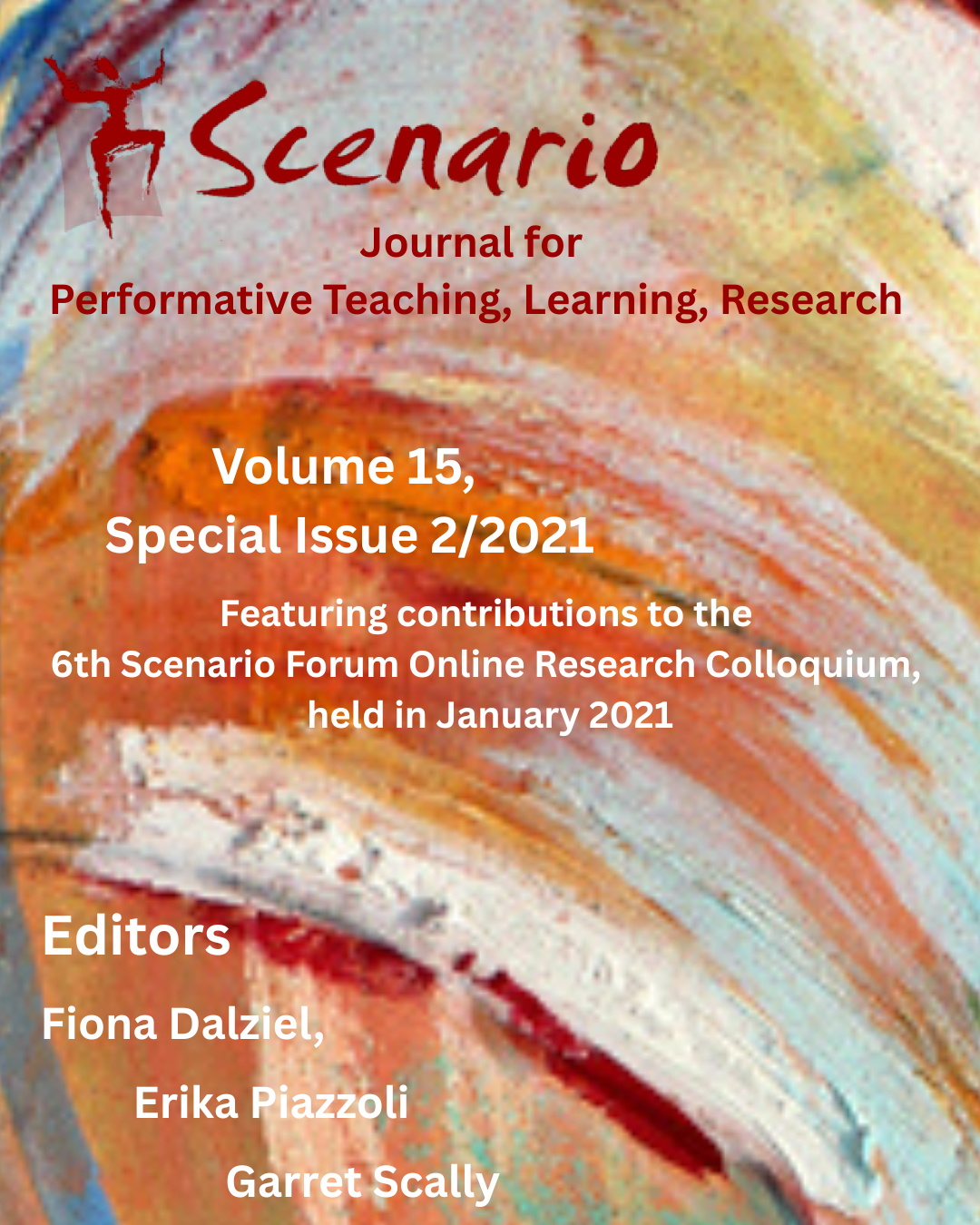Whose act(ing)? Intercultural educators in critical conversation on ethical practice across disciplines
DOI:
https://doi.org/10.33178/scenario.15.2.6Keywords:
Culture, Critically reflective practice, Ethics, Interdisciplinarity, Positionality, EmphatyAbstract
This piece introduces and recreates a critical dialogue which occurred in the summer of 2021 among educational practitioners at the University of Rhode Island (USA), during an interdisciplinary teach-in retreat on Intercultural Competence Development for Teachers and Learners. The authors were among the participants who collaborated on this project led by Anna Santucci; here, they offer a snapshot of the exchange that took place on the final day of the retreat. The themes that emerged throughout the teach-in, summarized in that closing conversation, significantly resonate with the RISE Manifesto (Cañas, 2015). These themes include salient values, skills, and behaviors of interculturally competent educators and scholars whose understanding of ethical practice is grounded in empathy, and whose work strives to embrace radical creativity in envisioning possibilities for co-creation among all participants in the teaching and/or research experience – enacting education through and for "action" via human act-ivation and, therefore, act-ivism.
References
Acharya, A (2014). Rethinking power, institutions and ideas in world politics: Whose IR? Routledge. https://doi.org/10.4324/9781315885346
Acharya, A (2016). Advancing global IR: challenges, contentions, and contributions. International Studies Review 18(1): 4–15. https://doi.org/10.1093/isr/viv016
Agar, M. (2021). The lively science: Remodeling human social research. Routledge Taylor & Francis Group. https://doi.org/10.4324/9781003052395
Anderson, K. D., Jackson, M., & Trogden, B. (2021). Looking back, moving forward: Intercultural communication must be part of all Learning. AAC&U Liberal Education 107(1). https://www.aacu.org/article/looking-back-moving-forward
Bennett, M.J. (1986). A developmental approach to training for intercultural sensitivity. International journal of intercultural relations 10(2), 179-196. https://doi.org/10.1016/0147-1767(86)90005-2
Bennett, M. (2017). Developmental model of intercultural sensitivity. In Y. Kim (Ed), Encyclopedia of intercultural communication. Wiley. https://doi.org/10.1002/9781118783665.ieicc0182
Boal, A. (1998). Legislative theatre: Using performance to make politics. Routledge.
Boal, A. (1979). Theater of the oppressed (Charles A. and Maria-Odilia Leal McBride Trans.). Urizen Books.
Buzan, B (2016). Could IR be different? International Studies Review 18(1), 155-157. https://doi.org/10.1093/isr/viv025
Byram, M. (2008). From foreign language education to education for intercultural citizenship: Essays and reflections. Multilingual Matters Ltd. https://doi.org/10.21832/9781847690807
Byram, M. (1997). Teaching and assessing intercultural communicative competence. Multilingual Matters.
Cañas, T. (2015). 10 things you need to consider if you are an artist. http://riserefugee.org/10-things-you-need-to-consider-if-you-are-an-artist-not-of-the-refugee-and-asylum-seeker-community-looking-to-work-with-our-community/
Deardorff, D. K. (Ed.) (2009). The Sage handbook of intercultural competence. Sage Publications.
Dolan, J. (2005). Utopia in performance: Finding hope at the theater. University of Michigan Press. https://doi.org/10.3998/mpub.119520
Eun, Y.-S. (2019). An intellectual confession from a member of the " non-white" IR community: a friendly reply to David Lake's "White 'Man's IR." PS: Political Science & Politics 52(1), 78-84. https://doi.org/10.1017/S1049096518001208
Fantini, A.E. (2009). Assessing Intercultural Competence. In D. Deardroff (Ed.), The Sage Handbook of Intercultural Competence (pp. 456-475). Sage Publications.
Freire, P. (1968/2003). Pedagogy of the oppressed. Continuum.
Lake, D. (2016). White Man's IR: An Intellectual Confession. Perspectives on Politics 14(4), 1112-1122. https://doi.org/10.1017/S153759271600308X
MacIntyre, A. C. (1981). After virtue: A study in moral theory. Duckworth.
Murray, C. (2020). Imperial dialectics and epistemic mapping: From decolonization to anti-Eurocentric IR. European Journal of International Relations 26(2), 419-442. https://doi.org/10.1177/1354066119873030
Santucci, A. (2019) Performing language and culture: Teaching and learning Italian through critical embodied encounters. [Doctoral dissertation, Brown University]. Brown Repository.
Verschelden, C. (2017). Bandwidth recovery: Helping students reclaim cognitive resources lost to poverty, racism, and social marginalization. Stylus.
Downloads
Published
Issue
Section
License
Copyright (c) 2021 Anna Santucci, Kristin Johnson, Donna Gamache-Griffiths

This work is licensed under a Creative Commons Attribution-NonCommercial 4.0 International License.







